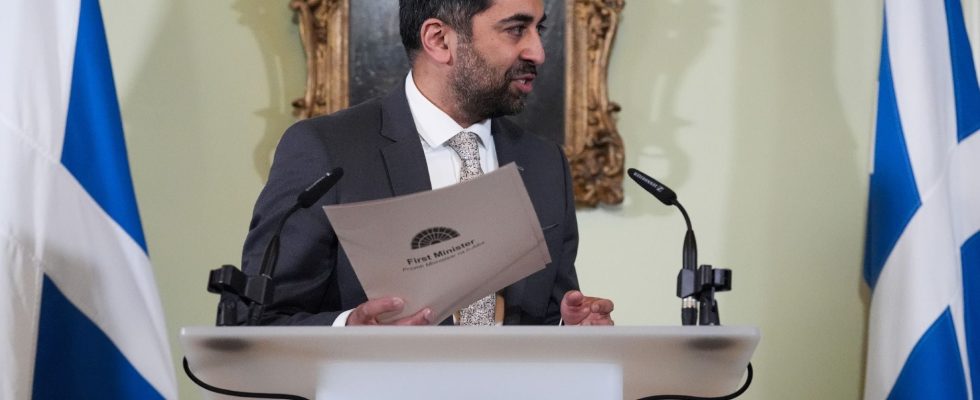A week of unrest, which was enough to put an end to more than a year at the head of the country. Scottish independence Prime Minister Humza Yousaf resigned this Monday, April 29 to avoid a double vote of no confidence in the local Parliament, where his party, the SNP, is in more difficulty than ever. Overcoming current political divisions “can only be done by someone else at the helm,” he told a news conference from his official residence at Bute House in Edinburgh.
Humza Yousaf succeeded the very popular Nicola Sturgeon at the end of March 2023, to whom he was very close. The son of a Pakistani immigrant, he became leader of the Scottish National Party (SNP, pro-independence) on March 27, 2023, and Prime Minister of Scotland two days later. Aged 37 at the time, he was the first Muslim leader of a major political party in the United Kingdom.
But its decision to abruptly end the government coalition between the SNP and environmentalists due to disagreements over environmental policy will have spelled its end. Since this announcement last week, he had lost the confidence of Parliament, and no other government alliance seemed possible.
Son of a Pakistani immigrant
Born in Glasgow, Humza Yousaf is the son of a Pakistani immigrant who arrived in this port city in the west of Scotland in the 1960s. Educated privately, then studying political science, he was first elected to the Scottish Parliament in 2011, taking the oath in Urdu and English. He was then appointed Minister for Europe and International Development, Minister for Transport, before being promoted to Justice by Nicola Sturgeon in 2018, and to Health in May 2021.
After becoming leader of the SNP last year, he recalled the role of immigration by paying tribute to his grandparents. “It reminds us that we should […] always celebrate immigrants who contribute so much to our country,” he added, a barely veiled dig at the British government which has just tightened asylum conditions in the United Kingdom.
His wife, Nadia El-Nakla, is of Palestinian origin. Last October, Humza Yousaf’s in-laws were stuck in Gaza for four weeks visiting his wife’s grandmother, and the SNP leader said those weeks were among the hardest of his life. life.
A country crossed by crises
Speaking of his beginnings in politics, first assistant to Alex Salmond, Nicola Sturgeon’s predecessor as leader of the SNP, Humza Yousaf sometimes recounted the racist attacks and comments to which he was the subject. “I have been the victim of a huge amount of attacks online, and unfortunately, sometimes also face-to-face,” he reported. In 2021, with his second wife Nadia El-Nakla, he filed a complaint for discrimination against a daycare center which had refused to welcome their daughter. The body in charge of inspections found the complaint to be well-founded. The couple has since abandoned her.
The first Muslim to hold a ministerial post in a Scottish government in 2012 and the youngest leader at the head of the SNP, Humza Yousaf was initially praised for his communication skills likely to unite the party, at a time when support for the independence – its main demand – is stagnating in the country. Humza Yousaf also promised that he would not legislate based on his own faith and assured that his experience would lead him to defend the rights of all minorities, including those of homosexuals and transgender people.
Very close to Nicola Sturgeon and an avowed republican, he will have had difficulty turning the page on his predecessor within the SNP. Particularly at a time when his country is suffering from inflation, and crises in its health system, over which he was responsible as minister, as well as in education. In addition, his party, positioned on the center-left, has suffered a series of setbacks over the past year. Nicola Sturgeon’s husband and former SNP chief executive, Peter Murrell, was recently charged with embezzlement in the investigation into the party’s finances.
To date, it is John Swinney, Deputy Prime Minister of Scotland from 2014 to 2023 and leader of the SNP between 2000 and 2004, who is the favorite to take over the leadership of the party, and thus, of the country. He himself told the British press that he was “very actively” considering running for the leadership of the SNP.
